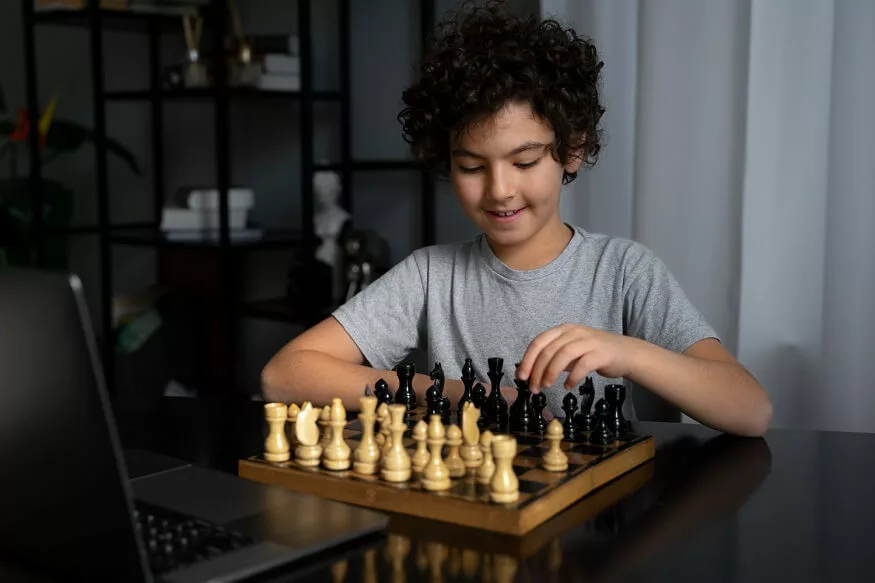According to research conducted at the University of Memphis, children’s visual memory, attention span, and spatial reasoning skills are drastically enhanced by chess. Improved recall, problem-solving efficiency, and pressure tolerance are encouraged by chess. The idea that education is a lifelong endeavor that can be undertaken at any age is promoted by chess class.
In fact, the chessboard is us, the events that happen are represented by the pieces, and the laws of nature are what we refer to as the rules of the game, while the player on the other side remains concealed from us. The notion that your child is never too young to play chess is something to be considered!
In today’s world, where intense rivalry exists, it is crucial to take chess class. Critical thinking should be enabled in children. Aptitude improvement and preparation for competition exams are achieved through playing chess, which is a game. A lot of promise has been demonstrated by online chess since the epidemic. The benefits of teaching children to play chess online will now be examined.
Would you like your child to be the next Chess Master? The following eight incredible reasons are listed below to explain why your child should be signed up for chess lessons.
Also Read: Reasons why playing chess is beneficial for children
Chess class challenges the mind.
When the rules of chess are learned by your children and then applied by them in chess class, their brains are exercised. To maintain our physical and mental health, our brains must be exercised. Children’s thinking abilities are improved in chess class because each move requires a decision to be made by them. In this game, making decisions is required. Aptitude, creativity, and abstract reasoning are enhanced by this. To accomplish that goal, a strategic plan that allows for flexibility in response to varying conditions, such as the moves of the opponent player, must be employed by a chess player.
Chess tutoring makes the child a positively proficient planner.
Significant improvement in planning skills is achieved by playing chess. An initial move is sometimes found challenging to be chosen by even the most seasoned players in chess class, although every chess game begins with a strategy. Emphasis is placed on planning ahead and organizing your pieces in chess lessons for children. The “Secret Mission” story series and our cutting-edge STARS curriculum are utilized by Chess at Three to assist children in mastering their opening moves.
Also Read: World Chess Day: 20 Interesting facts about chess
Chess courses make children better at problem-solving.
Difficulties and obstacles will undoubtedly be encountered by children during each chess game in the chess course that they have never encountered before. People can be taught by chess to plan ahead, not make snap decisions, and more importantly how to balance the benefits and drawbacks of many options.
Chess tutoring improves concentration.
Increased concentration is achieved by no other game like chess. Consequently, it is recommended that chess be insisted upon for your children’s learning. Given that this is the period during which this skill can be developed the most, it is advisable for kids to engage in games that aid them in focusing like chess class. As the board is observed, the pieces are viewed, their actions are considered, and every potential countermove by their adversary is anticipated, concentration is enhanced in children.
Chess class improves a Child’s Academic Performance.
Your child’s academic performance is strengthened by chess training. Intellect is made sharper by chess lessons. Both reading comprehension and numerical problem-solving abilities are enhanced in chess class. Your children are required to complete several mental calculations in a chess course, which trains them to be rational people.
Chess Lessons spark the imagination.
Isn’t it amazing? Although the very last advantage you would anticipate your child learning from playing chess is creativity, it is ranked first in our book! As the game is progressed through by a chess player, inventiveness and imaginative thinking are considered essential, but Chess at Three goes beyond that. A more creative stance is encouraged to be approached towards chess class.
Also Read: How to Guide Cognitive Development in Kids for Effective Learning?
Chess boosts confidence and rewards effort.
Becoming an expert at a chess move is nothing more satisfying! A club that has existed for over 10,000 years will be joined by your child when chess is learned. Congratulations!
Your child will be given a connection to other like-minded people far into adulthood, as well as confidence and confidence will be instilled in them by chess proficiency. A skill that can be used in high school, college, or even the workplace can be thought of when your child is taught!
Chess improves critical thinking and elevates mental activity.
“If-then” thinking skills are developed by kids through chess. Even after the chess tutoring has ended, the ability to carefully consider many options is considered a vital talent. Frequent prompts are given to our pupils to “play both sides of the game.” Drifting off is not allowed! The move by the opponent cannot be relied upon to be revealed; it must be kept an eye out for. Concentration skills are strengthened by remaining attentive during an opponent’s move in chess tutoring.
Chess class teaches your child to be Independent.
Chess is an individual activity; therefore, it is learned by the child the more it is played by them. When a chess club is joined by your child, a gradual feeling of ease and independence will be experienced by them. I wonder what the most fascinating aspect of this point is. Along with self-confidence being boosted and the child being educated to take responsibility for his or her own activities, getting to know themselves without relying on the accomplishments of others would be enabled by it.
Chess tutoring protects your child from Diseases and Disabilities.
If mental exercises like chess, puzzles, and other similar games are engaged in from a young age, it has been demonstrated that conditions like ADHD (attention deficit hyperactivity disorder), dyslexia, and even cognitive disorders like Alzheimer’s disease can be avoided. The brain’s health and fitness are aided by constant exercise in chess tutoring, just like any other muscle area. In this situation, the adage “using it or losing it” certainly holds true. On the other hand, memory issues over time, if not right away, are experienced by those who don’t frequently play chess.
Also Read: How To Play Chess: Rules, Tactics and Strategies
Conclusion
At EuroSchool, the best growth of your child is ensured, and their thinking skills are developed in a way that makes them stand out in a competition.
A mental game that requires a lot of time and thought is played in chess. Prediction and problem-solving abilities are deemed necessary. In the game of chess, a mental conflict is engaged between two players. It is a board game that necessitates perseverance, confidence, pace, patience, and other traits. However, the growth of your child is facilitated, and the ability to reason is bestowed upon them. It is ensured that the child is provided with the best-required strategy and tactics to play chess.










